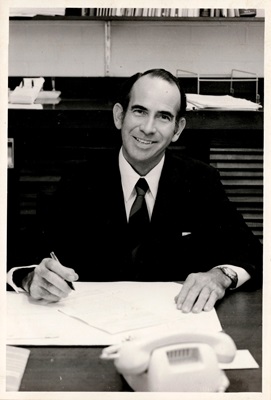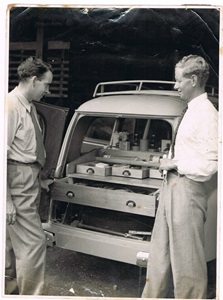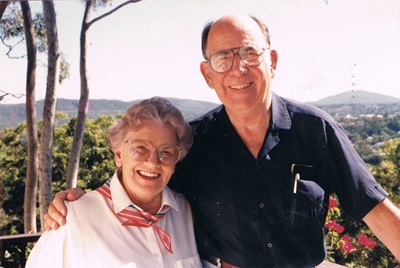
Dr Hubert George Osborne AM, known as George, was a long-serving member of the UQ veterinary faculty, dedicating 30 years of his life to the School and its students. He served as Dean from 1971-1972 and, in 1991, was awarded an Order of Australia for service to veterinary medicine.
Dr Osborne’s lifelong interest in large animals began in childhood, growing up on a dairy farm in Glen Innes, New South Wales. After completing a degree in veterinary science at the University of Sydney in 1944, he worked in Melbourne and New Zealand before returning to Glen Innes to start a vet practice in 1951.
Around this time, the Faculty of Veterinary Science at UQ was experiencing a period of growth. Following a decision to reorganise into four departments, George Osborne was appointed Head of the Department of Veterinary Clinical Studies in 1955, as well as Chief Lecturer or what would today be Associate Professor.
“My father was always a strong believer in hands-on education,” says his daughter, Dr Linda Osborne. Long before the concept of experiential learning went mainstream, George was taking groups of UQ students down to the family farm, which had by then expanded to include sheep as well as cattle, to put their classroom skills into practice.
Linda credits her mother as the unsung hero who made her father’s work possible. She ran the house while he was home and away, hosting overseas students and work functions and spontaneous evening drinks on the deck when students and staff would drop by for a chat.
As Chief Lecturer, Osborne’s brief was sheep and beef cattle. His vision was for a teaching and research centre in a rural, farming community, where staff and students would provide services to the community and contribute to the wellbeing of farmers and graziers in the district. The centre would be a local resource and, in turn, local operators would offer students learning and research opportunities.

George was clear on purpose. The veterinary centre would have three integrated functions: “… first to develop and deliver an innovative veterinary practice … relevant to the sheep and beef cattle industries, secondly to carry out research of an applied nature on problems of animal production identified by the service, and thirdly to teach pastoral veterinary medicine to senior veterinary students."
As the hub of a rich agricultural district on the border of New South Wales and Queensland with good transport links to Brisbane, Goondiwindi was an excellent location for such a centre. In 1956, concept development began for the Goondiwindi Pastoral Veterinary Centre. Nine years later, George’s vision was realised when the Centre was opened on 24 September 1965 by the then Premier of Queensland, the Honourable George Nicklin. Purchase of the land – 20 acres – was made possible through a gift of 2000 pounds from local graziers, the Elliott family, on the condition that a veterinary service be established.
Hospital and surgery facilities for small and large animals were part of the new Goondiwindi Pastoral Veterinary Centre, as were diagnostic laboratories. All final-year veterinary students were to spend three weeks at the Centre, travelling from Brisbane in groups of six-to-eight. In 1983, the UQ Alumni Association, now Alumni Friends, provided the funds for student accommodation to be built on-site.
Recollections from alumni on these early ‘bush trips’ reveal far more than excellent hands-on learning experiences. For many students, this was the first time they’d been given the responsibility of handling their own cases. They had fun, gained real and eye-opening insights into the highs and lows of farming and veterinary life, and returned to Brisbane with friends for life.
In addition to the educational impact of the Centre and its facilities, it enabled research in areas critical to the farming industry, such as disease control and eradication, herd health, breeding and fertility. The first full-time postgraduate research student at Goondiwindi was appointed in 1958, even before the Centre was opened. Keith Hughes was the recipient of a scholarship established by the Wool Board for the study of haemonchosis, a parasitic disease with the power to decimate graziers’ sheep herds. Under Osborne’s supervision, Hughes undertook his research accommodated in the old wool shed on a local property, working closely with farmers and graziers and well aware of the challenges they faced.

Production Animal Service (PAS) remains a key part of teaching, clinical training and research at UQ’s School of Veterinary Science. With the relocation of the Vet School and establishment of purpose-built facilities at UQ’s Gatton campus, activities previously undertaken at the Goondiwindi Pastoral Veterinary Centre were consolidated at Gatton in 2010. Today, teaching and research tied to on-farm care of production herds like commercial dairy and beef cattle, sheep and goats are as important as they were when the Centre was established nearly 60 years ago. Research continues to drive disease prevention and diagnosis, genetic understanding and reproductive health.
By all accounts an extremely hard worker, George Osborne generously shared his knowledge and passion for the greater good. His daughter Linda recalls a holiday spent with her father advising the Solomon Islands government on beef cattle production! He continued working with staff and students at UQ after his retirement in 1985 and was still involved in the running of the family farm at Glen Innes until it was sold after 113 years in the family. On his passing in 2007, his family established the George Osborne Research Scholarship to honour George’s passion for education and vision for exceptional support of an industry so integral to Queensland and Australia.
A scholarship is a wonderful way to celebrate the life and legacy of a loved one. To the student who receives it, it is so much more than financial support. It says, “We believe in you.”
If you’d like to invest in someone’s potential through a named scholarship, please contact Anthea Barry, Advancement Manager in the Faculty of Science.
Did you take a final-year trip to Goondiwindi as a vet student? We’d love to hear your memories. Please write or call Marlin Othman, Alumni and Community Manager, Faculty of Science.



